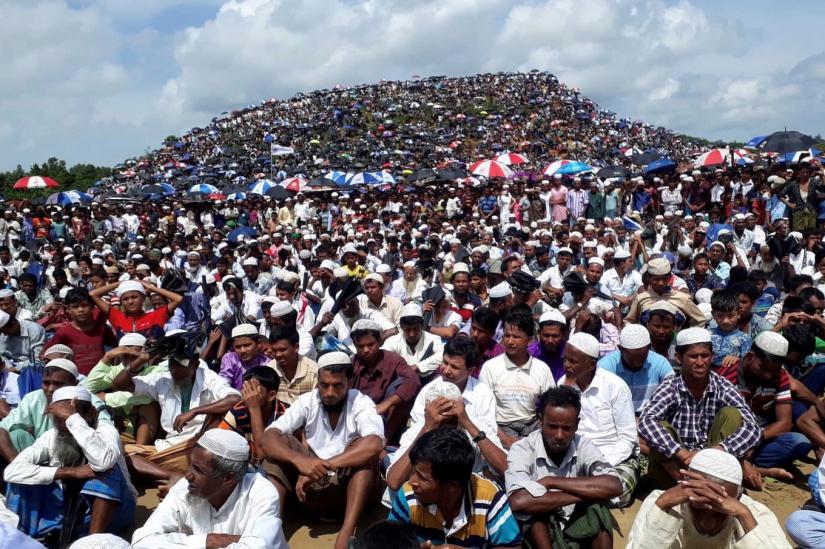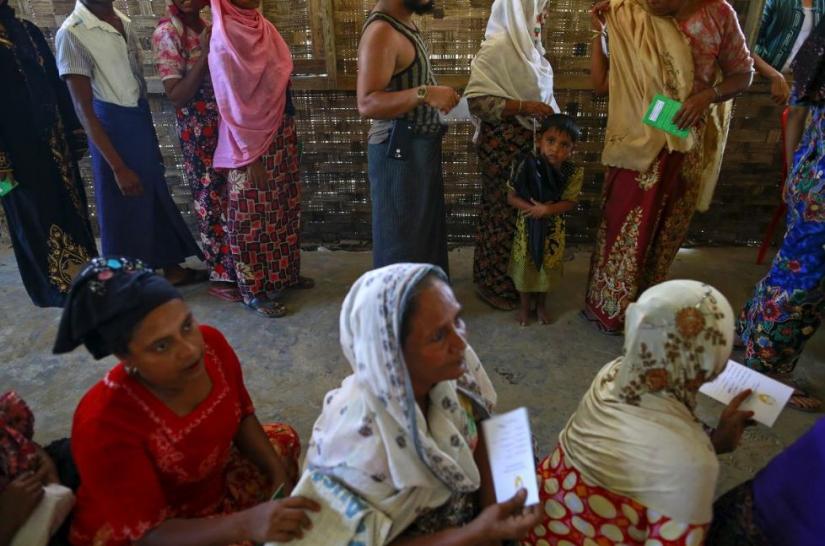 Indian Foreign Minister Subrahmanyam Jaishankar wrote a letter to the Foreign Minister of Bangladesh regarding Rohingya repatriation. He said that India wanted a peaceful and fair Rohingya repatriation. India is always by the side of Bangladesh. Rohingya refugees were not only the problem of Bangladesh but they concerned all the neighbouring countries around Bangladesh.
Indian Foreign Minister Subrahmanyam Jaishankar wrote a letter to the Foreign Minister of Bangladesh regarding Rohingya repatriation. He said that India wanted a peaceful and fair Rohingya repatriation. India is always by the side of Bangladesh. Rohingya refugees were not only the problem of Bangladesh but they concerned all the neighbouring countries around Bangladesh.
In the Non-Alliance Summit, in Baku, at a sideline meeting, the Chinese Foreign Minister assured the Prime Minister of Bangladesh that China would set up a tripartite committee involving China, Bangladesh and Myanmar. They would work for the solution to the Rohingya problem.
Such initiatives from China and India are a positive sign for Rohingya refugee repatriation. The whole world has to work for resolving this problem but China and India are two big neighbouring countries. So, they can play a more vital role than others. Initially, these two countries were reluctant to play a role. India was involved on humanitarian grounds. But they were reluctant about resolving the problem of the repatriation of Rohingya refugees. China’s position was mysterious. They were interested in the ‘Sittwe Port’ project instead of Rohingya repatriation.
Bangladesh was bound to make a bilateral treaty with Myanmar for resolving the Rohingya refugee problem. It tried to draw more attention from the international forum. In 2017, Prime Minister of Bangladesh presented five points in the United Nations General Assembly. Besides that, the Prime Minister and the Foreign Minister of Bangladesh tried to present the problem of Rohingya people in many summits and bilateral meetings with other countries.
In the primary stage, Bangladesh made a mistake. They tried to draw the attention of the Muslim countries. It was totally a wrong step. Firstly, Bangladesh is a modern country and it was never a Muslim country.
 All over the world, refugees are never categorized by religion. They are always recognized as human beings and people help them on humanitarian grounds. The United Nations Human Rights Commission (UNHRC) helps refugees all over the world on the humanitarian ground. Basically, Bangladesh put their feet in the trap of Myanmar. Myanmar presented facts in such a way that it looked like they were forced to evacuate the Muslim people, not the Burmese. But Rohingyas are citizens of Myanmar and they are Burmese by birth. Myanmar’s military authorities projected these facts so successfully that not only Bangladesh but also other countries marked these Myanmar’s citizens as Muslim refugees. Why Myanmar’s military did that is not clear. It might be said that they wanted to portray that they were evacuated for being Muslim militants from their country. They know the West and many other countries are annoyed with Islamist militants or Muslim militant. But one million common people cannot be militant. Thanks to the world community, they did not portray all the Rohingya refugees as militant. All over the world in the refugee camps, some vulnerable people are being used by many notorious groups: they may be militants, smugglers, human traffickers and others. In Bangladesh, the position of Rohingya refugee camp is in the border regions: Bangladesh, Myanmar and India. Once, this position was called the ‘Golden Triangle’. This triangle was the fertile ground for the smugglers. Cocaine, Opium, Heroin Smuggling and Human Trafficking were the regular features of this area. India and Bangladesh are trying to stop it. But Myanmar military authority supports this notorious business. Now, Yaba is the main drug for the smugglers of this area. The owner of the local production factories is the military authority of Myanmar. Bangladesh went on the warpath against Yaba smugglers within the country; the government of Bangladesh seized the land and the other wealth of the Yaba smugglers. Under the circumstances, Myanmar’s military authority has made an unholy rapport with some Rohingya refugees and they are using them for Yaba smuggling. Now, in Bangladesh, Yaba smuggling is controlled through the Rohingya refugee camp. When smugglers become strong, some militant groups automatically join with them. It is happening in the Rohingya camp. Some sources say that many Pakistani militant groups are working as the donor agency. Some Middle East money is being invested here for the military operation. It has an old history. After the liberation of Bangladesh, Saudi Arabia funded the NGO Rabeta-al-Alam-al-Islami, for helping the stranded Pakistanis in Bangladesh. Truly, most of the workers of Rabeta-al-Alam-al-Islami were the members of Jamat-E-Islami Bangladesh. They also were the collaborators of Pakistani soldiers in 1971 and fought against Bangladesh. They used this money to build up their militant organization in Bangladesh and now, they are working in the refugee camp for recruiting some militant people.
All over the world, refugees are never categorized by religion. They are always recognized as human beings and people help them on humanitarian grounds. The United Nations Human Rights Commission (UNHRC) helps refugees all over the world on the humanitarian ground. Basically, Bangladesh put their feet in the trap of Myanmar. Myanmar presented facts in such a way that it looked like they were forced to evacuate the Muslim people, not the Burmese. But Rohingyas are citizens of Myanmar and they are Burmese by birth. Myanmar’s military authorities projected these facts so successfully that not only Bangladesh but also other countries marked these Myanmar’s citizens as Muslim refugees. Why Myanmar’s military did that is not clear. It might be said that they wanted to portray that they were evacuated for being Muslim militants from their country. They know the West and many other countries are annoyed with Islamist militants or Muslim militant. But one million common people cannot be militant. Thanks to the world community, they did not portray all the Rohingya refugees as militant. All over the world in the refugee camps, some vulnerable people are being used by many notorious groups: they may be militants, smugglers, human traffickers and others. In Bangladesh, the position of Rohingya refugee camp is in the border regions: Bangladesh, Myanmar and India. Once, this position was called the ‘Golden Triangle’. This triangle was the fertile ground for the smugglers. Cocaine, Opium, Heroin Smuggling and Human Trafficking were the regular features of this area. India and Bangladesh are trying to stop it. But Myanmar military authority supports this notorious business. Now, Yaba is the main drug for the smugglers of this area. The owner of the local production factories is the military authority of Myanmar. Bangladesh went on the warpath against Yaba smugglers within the country; the government of Bangladesh seized the land and the other wealth of the Yaba smugglers. Under the circumstances, Myanmar’s military authority has made an unholy rapport with some Rohingya refugees and they are using them for Yaba smuggling. Now, in Bangladesh, Yaba smuggling is controlled through the Rohingya refugee camp. When smugglers become strong, some militant groups automatically join with them. It is happening in the Rohingya camp. Some sources say that many Pakistani militant groups are working as the donor agency. Some Middle East money is being invested here for the military operation. It has an old history. After the liberation of Bangladesh, Saudi Arabia funded the NGO Rabeta-al-Alam-al-Islami, for helping the stranded Pakistanis in Bangladesh. Truly, most of the workers of Rabeta-al-Alam-al-Islami were the members of Jamat-E-Islami Bangladesh. They also were the collaborators of Pakistani soldiers in 1971 and fought against Bangladesh. They used this money to build up their militant organization in Bangladesh and now, they are working in the refugee camp for recruiting some militant people.
 To sum it up, there are some militants, drug smugglers even human traffickers in the Rohingya camp of Bangladesh. Bangladesh is going to take steps against them. That’s why; they have taken a decision about setting up some law enforcement post inside the camp. But it would be a very tough job to prevent these types of crimes. These types of crimes always cross the borders. The Prime Minister of Bangladesh said in the Non-Alliance Summit that the Rohingya refugee problem would hamper the harmony or peace of neighbouring countries and the world.
To sum it up, there are some militants, drug smugglers even human traffickers in the Rohingya camp of Bangladesh. Bangladesh is going to take steps against them. That’s why; they have taken a decision about setting up some law enforcement post inside the camp. But it would be a very tough job to prevent these types of crimes. These types of crimes always cross the borders. The Prime Minister of Bangladesh said in the Non-Alliance Summit that the Rohingya refugee problem would hamper the harmony or peace of neighbouring countries and the world.
It is a very good sign that China and India are taking some decisions. Their business with Myanmar is important but the law and order situation comes more significantly in this matter of fact. In this context, these two countries have turned over their attitude regarding Rohingya.
Moreover, China and India need to understand Myanmar’s authority through new perspectives because they are not the same people in the field of business and ethnic problem-solving. They are very snippy people in this area of interest. They tell lie, escape from their commitment and sometimes very rigid to solve a simple problem. They always try to make a simple matter more complex. For example, Rohingya’s are their citizens and they have evacuated them. They are taking shelter in Bangladesh. Now, they want their list for checking citizenship. Basically, it is a cunning manner for making a simple problem into the complex.
In conclusion, China and India need to work jointly and sharply with Myanmar for the repatriation of Rohingya refugees.
A state award-winning journalist, Swadesh Roy can be reached at [email protected].


